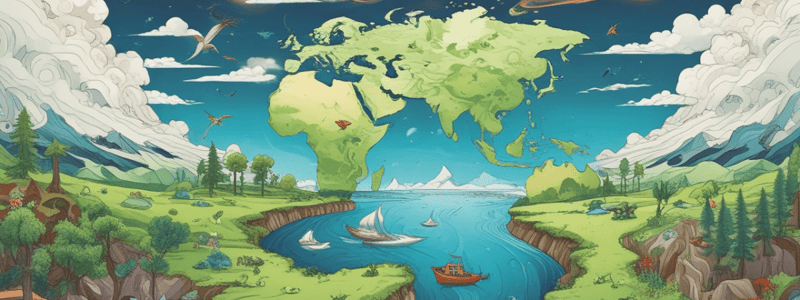Podcast
Questions and Answers
What is the projected increase in average global temperature by 2100 if greenhouse gas emissions continue to rise?
What is the projected increase in average global temperature by 2100 if greenhouse gas emissions continue to rise?
- 5-7°C
- 2-5°C (correct)
- 1-2°C
- 0.5-1°C
What is the average annual rate of sea level rise?
What is the average annual rate of sea level rise?
- 3.2 mm (correct)
- 4.5 mm
- 1.2 mm
- 2.5 mm
Which of the following is NOT a consequence of rising global temperatures?
Which of the following is NOT a consequence of rising global temperatures?
- Decreased risk of droughts (correct)
- Increased risk of wildfires
- Increased frequency and severity of heatwaves
- Changes in species populations and distributions
What is the primary cause of ocean acidification?
What is the primary cause of ocean acidification?
What is a consequence of changes in water cycles and precipitation patterns?
What is a consequence of changes in water cycles and precipitation patterns?
What is a threat to human health due to climate change?
What is a threat to human health due to climate change?
What is a consequence of rising global temperatures on ecosystems and biodiversity?
What is a consequence of rising global temperatures on ecosystems and biodiversity?
What is the current trend in global temperatures?
What is the current trend in global temperatures?
Flashcards are hidden until you start studying
Study Notes
Environmental Impact of Climate Change
Rising Global Temperatures
- Average global temperature has risen by about 1°C since the late 1800s
- 20 of the last 22 years have been the warmest on record
- Projected to increase by another 2-5°C by 2100 if greenhouse gas emissions continue to rise
Consequences of Rising Temperatures
- Melting of Polar Ice Caps: Sea levels rising by about 3.2 mm per year
- Extreme Weather Events: Increased frequency and severity of heatwaves, droughts, and heavy rainfall
- Changes in Precipitation Patterns: Altered patterns of rainfall and snowfall, leading to more frequent floods and droughts
Impact on Ecosystems and Biodiversity
- Loss of Biodiversity: Rising temperatures altering habitats, leading to extinction of many plant and animal species
- Disruption of Food Chains: Changes in species populations and distributions affecting ecosystems
- Increased Risk of Wildfires: Droughts and heatwaves creating conditions for devastating wildfires
Effects on Water Resources
- Changes in Water Cycle: Altered patterns of evaporation, condensation, and precipitation
- Increased Risk of Water Scarcity: Changes in precipitation patterns and rising temperatures affecting water availability
- Threats to Human Health: Contamination of water sources and increased risk of water-borne diseases
Ocean Acidification
- Increase in CO2 Absorption: Oceans absorbing more CO2, leading to acidification
- Impact on Marine Life: Acidification affecting marine ecosystems, especially coral reefs and shellfish
- Consequences for Global Food Security: Impacts on fisheries and marine food chains
Environmental Impact of Climate Change
Rising Global Temperatures
- The average global temperature has risen by about 1°C since the late 1800s
- The last 22 years have seen a record-breaking temperature trend, with 20 of them being the warmest on record
- If greenhouse gas emissions continue to rise, the global temperature is projected to increase by another 2-5°C by 2100
Consequences of Rising Temperatures
- The melting of polar ice caps is causing sea levels to rise by about 3.2 mm per year
- The frequency and severity of heatwaves, droughts, and heavy rainfall are increasing
- Changes in precipitation patterns are leading to more frequent floods and droughts
Impact on Ecosystems and Biodiversity
- Rising temperatures are altering habitats, leading to the extinction of many plant and animal species
- Changes in species populations and distributions are disrupting food chains
- The increased risk of wildfires is a result of droughts and heatwaves
Effects on Water Resources
- The water cycle is being altered, with changes in evaporation, condensation, and precipitation
- The increased risk of water scarcity is a result of changes in precipitation patterns and rising temperatures
- The contamination of water sources and increased risk of water-borne diseases are threatening human health
Ocean Acidification
- The oceans are absorbing more CO2, leading to acidification
- Ocean acidification is affecting marine ecosystems, especially coral reefs and shellfish
- The consequences of ocean acidification are impacting global food security, affecting fisheries and marine food chains
Studying That Suits You
Use AI to generate personalized quizzes and flashcards to suit your learning preferences.




